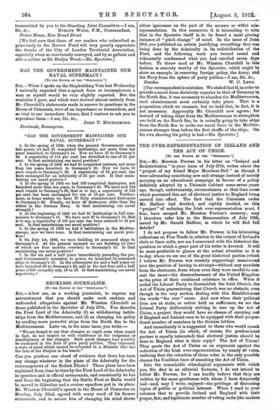RECKLESS JOURNALISM.
[To THE EDITOR OF THE "SPECTATOR."' SIR,—Allow me, as a working journalist, to express my astonishment that you should make such reckless and =founded allegations against Mr. Winston Churchill as those published in the Spectator of July 27th. You describe the First Lord of the Admiralty (1) as withdrawing battle- ships from the Mediterranean, and (2) as changing his policy by sending more powerful ships from the North Sea to the Mediterranean. Later on, in the same issue, you write :— " We are bound to say that changes so rapid, even when sound in fact, do not inspire us with confidence in the judgment cr steadfastness of the changer. Such quick changes may possibly be condoned in the field of pure party politics. They represent a state of mind which cannot be tolerated in a Minister who has the fate of the Empire in his hands."
Can you produce one shred of evidence that there has been any change whatever in the plans of the Admiralty for the rearrangement of the British Fleets P These plans have been explained from time to time by the First Lord of the Admiralty in speeches and in official memoranda, and consistently he has said from the beginning that the Battle Fleet at Malta would be moved to Gibraltar and a cruiser squadron put in its place. Mr. Winston Churchill's speech in the House of Commons on Monday, July 22nd, agreed with every word of his former statements, and to accuse him of changing his mind shows
either ignorance on the part of the accuser or wilful mis- representation. In this connexion it is interesting to note that in the Spectator itself is to be found a most glaring instance of "quick change" of mind. In the issue of June 29th you published an article justifying everything that was being done by the Admiralty in its redistribution of the Fleet, and the following week you turned round and vehemently condemned what you had extolled seven days before. To throw mud at Mr. Winston Churchill in this fashion is scarcely worthy of the Spectator, which ought 'to show an example in removing foreign policy, the Army, and the Navy from the sphere of party politics.—I am, Sir, &c., [Our correspondent is mistaken. We stated that if, in order to provide a naval force decisively superior to that of Germany in the North Sea, it was necessary to abandon the Mediterranean, such abandonment must certainly take place. That is a proposition which we reassert; but we hold that, in fact, it is not necessary. Apparently Mr. Churchill now agrees; for instead of taking ships from the Mediterranean to strengthen our hold on the North Sea, he is actually going to take ships from the North Sea to make our naval force in the Mediter. ranean stronger than before the first shuffle of the ships. On his own showing his policy is bad.—En. Spectator.]




































 Previous page
Previous page